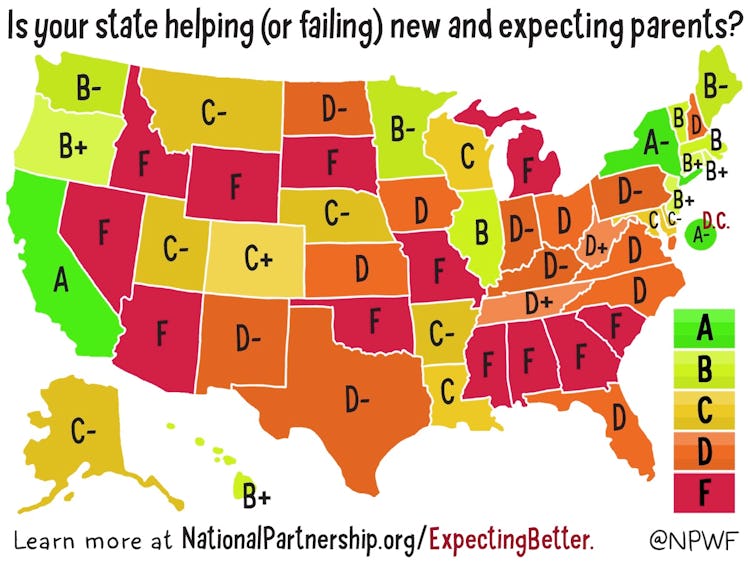Your State Just Received Its Report Card On How Much It Helps New Parents
Are you getting ice cream or grounded?

In honor of the 23rd anniversary of the Family And Medical Leave Act (FMLA) taking effect, the National Partnership for Women & Families released the 2016 Expecting Better: A State-by-State Analysis of Laws That Help Expecting and New Parents. Unfortunately, if a lot of these states were your kids, they would not be getting any ice cream after bringing home their report card.
National Partnership For Women & Families
Researchers graded states across a number of different metrics for both private and public sector employees: paid family and medical leave, job-protected family and medical leave, paid sick days, flexible use of sick time, pregnancy accommodations, and nursing mothers’ workplace rights (sorry, nursing fathers). A whopping 27 states received grades of D or F, mostly for failing to expand their family-specific laws beyond the bare minimum required by FMLA. FMLA, you’ll recall only requires businesses with 50 employees or more to not fire if you if you take up to 12 weeks — unpaid! — after the birth of a kid or to care for a sick relative. FMLA should not be confused with FML, a phrase you might be familiar with if you live in any of the aforementioned states.
FMLA should not be confused with FML, a phrase you might be familiar with if you live in any of the aforementioned states.
California was the only state with literally Grade A policies, but it wasn’t all bad news. New York and the District of Columbia weren’t far off, and 11 states improved their grades significantly since last year’s Expecting Better report. In the 11 years since the first edition was release in 2005, New Jersey, New York and Rhode Island, have joined California in enacting paid family leave programs. California, Connecticut, Massachusetts, Oregon, Vermont and the District of Columbia, have implemented laws that guarantee the right to earn paid sick days, and Maine, Maryland and Minnesota gave workers more flexibility when using sick time. Colorado, Maine, Maryland, Massachusetts, Minnesota, Oregon, Washington and Wisconsin, also expanded employee access to unpaid, job-protected family and medical leave.
National Partnership For Women & Families
That’s technically progress, but it’s too slow to make much of a dent in the race to catch up with the 183 countries with guaranteed paid maternity leave (79 of which also have guaranteed paid paternity leave). On a micro level, companies like these 50 increasingly do right by their new parents; on a macro level, we’re still at the back of the pack, hanging out with Papua New Guinea and Oman as the only countries that don’t think our new parents should have guaranteed paid leave.
Now that everyone’s seen its report card, maybe California can share what it’s doing right with the rest of the class.